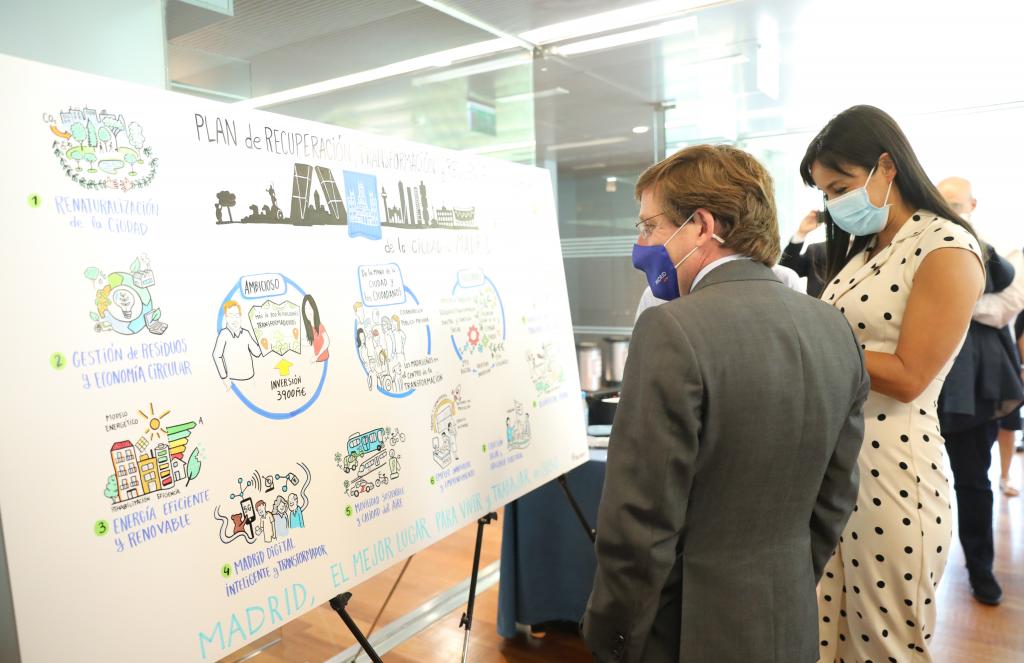Thessaloniki gets ready for its metro launch in November
The underground rapid transit lines have been under construction for almost two decades due to various project delays
 TheMayor.EU logo
TheMayor.EU logo 
Madrid's mayor and vice mayor having a look at a visual representation of the plan, Source: Ayuntamiento de Madrid
The subsidies from the EU Recovery Plan will be used to let the city resume its pre-Covid trajectory
The mayor of Madrid, José Luis Martínez Almeida presented on Thursday, 10 June, the Municipal Recovery, Transformation and Resilience Plan that seeks to make the Spanish capital the best city to live and work in by 2030. The authorities are looking towards the upcoming 3.9 billion euros of funding coming from the European Recovery Plan to serve as the vehicle that will make this ambitious plan possible.
The capital’s administration, however, is not simply relying on the cash injection to make miracles out of nothing. The presentation established the priority axes and projects that will make it possible to strengthen the transformation strategy through the financing offered, counting on a strong public-private partnering in the process.
Madrid is fully focused on returning to its growth track that it was enjoying in 2019 before the Covid pandemic struck. That is why the Municipal Plan had been developed, since its inception, in full cooperation with the national operational program. Urban authorities have considered it imperative to seek cooperation with the regional and national governments for the full realization and impact of the transformation.
The Plan comprises 105 projects with a direct investment of 3.9 billion euros, aimed at promoting the ecological transition, digital transformation and social cohesion, in line with European and national strategies. The plan expects to mobilize another 4 billion euros in the entire economy of the city, which would mean a total of 60,000 jobs created - 40% of them direct.
There are ten lines of action, which constitute a catalogue of high-impact actions in strategic areas, aligned with the policies of the national plan. The lines of action are: renaturation of the city; waste management and circular economy; efficient and renewable energy; Digital, intelligent and transformative Madrid; sustainable mobility and air quality; innovative employment and entrepreneurship; social cohesion and territorial balance; urban regeneration; Resilient municipal infrastructures and services and resilient and trained childhood, adolescence and youth.
"This is a plan that affects everyone and belongs to everyone, a participated and shared plan, which is long-term and with a vocation for permanence," said Begoña Villacís, vice mayor of Madrid who was also present at the presentation.
The overall proportion of the actions envisaged in the plan for the ecological transition is 57%, demonstrating Madrid's commitment to sustainability, while 29% of the investments respond to the digitalization objective. The Plan identifies a series of actions in which different formulas of public-private collaboration can fit, with the aim of increasing the capacity and efficiency of investment in projects due to the multiplier effect from the mobilization of public resources.
If you want to keep up with how European cities and regions are changing, follow us on Facebook, Twitter and Instagram.

The underground rapid transit lines have been under construction for almost two decades due to various project delays

Now you can get your wine in Talence by paying directly in Bitcoin

That’s because the state has to spend money on updating the railway infrastructure rather than subsidizing the cost of the popular pass

Rethinking renewable energy sources for the urban landscape

The examples, compiled by Beyond Fossil Fuels, can inform and inspire communities and entrepreneurs that still feel trepidation at the prospect of energy transition

Now you can get your wine in Talence by paying directly in Bitcoin

The 10th European Conference on Sustainable Cities and Towns (ESCT) sets the stage for stronger cooperation between the EU, national and local level to fast track Europe's transition to climate neutrality.

At least, that’s the promise made by the mayor of Paris, Anne Hidalgo

The underground rapid transit lines have been under construction for almost two decades due to various project delays

At least, that’s the promise made by the mayor of Paris, Anne Hidalgo

Hostal de Pinós is located in the geographical centre of the autonomous region

Despite its church-y name, the district has long been known as the hangout spot for the artsy crowds

Urban dwellers across the EU are having a say in making their surroundings friendlier to people and the environment.

Forests in the EU can help green the European construction industry and bolster a continent-wide push for architectural improvements.

Apply by 10 November and do your part for the transformation of European public spaces

An interview with the Mayor of a Polish city that seeks to reinvent itself

An interview with the newly elected ICLEI President and Mayor of Malmö

A conversation with the Mayor of Lisbon about the spirit and dimensions of innovation present in the Portuguese capital














